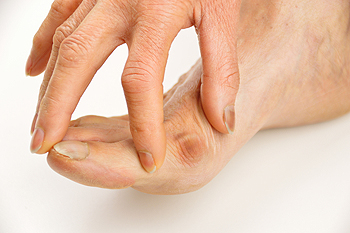Understanding Bunions

Bunions are bony protrusions that form at the base of the big toe, causing it to angle inward toward the other toes. This misalignment can lead to pain, swelling, and difficulty finding comfortable footwear. As bunions progress, they can also result in inflammation and increased pressure on the other toes, leading to additional foot problems. The causes of bunions can vary, but they are often linked to genetics, improper footwear, especially narrow or high-heeled shoes, and certain medical conditions. While conservative treatments like padding, orthotics, and wearing appropriate shoes can provide relief, severe cases may require surgical intervention. If you are experiencing foot pain or notice the development of a bunion, it is important to address the issue early. Do not let bunions disrupt your daily life. It is suggested you schedule an appointment with a podiatrist. They can assess your condition, recommend treatment options, and help you regain foot comfort.
If you are suffering from bunion pain, contact one of our doctors of New England Foot & Ankle . Our doctors can provide the care you need to keep you pain-free and on your feet.
What Is a Bunion?
Bunions are painful bony bumps that usually develop on the inside of the foot at the joint of the big toe. As the deformity increases over time, it may become painful to walk and wear shoes. Women are more likely to exacerbate existing bunions since they often wear tight, narrow shoes that shift their toes together. Bunion pain can be relieved by wearing wider shoes with enough room for the toes.
Causes
- Genetics – some people inherit feet that are more prone to bunion development
- Inflammatory Conditions - rheumatoid arthritis and polio may cause bunion development
Symptoms
- Redness and inflammation
- Pain and tenderness
- Callus or corns on the bump
- Restricted motion in the big toe
In order to diagnose your bunion, your podiatrist may ask about your medical history, symptoms, and general health. Your doctor might also order an x-ray to take a closer look at your feet. Nonsurgical treatment options include orthotics, padding, icing, changes in footwear, and medication. If nonsurgical treatments don’t alleviate your bunion pain, surgery may be necessary.
If you have any questions, please feel free to contact our offices located in Wakefield, MA, Nashua and Derry, NH . We offer the newest diagnostic and treatment technologies for all your foot care needs.
